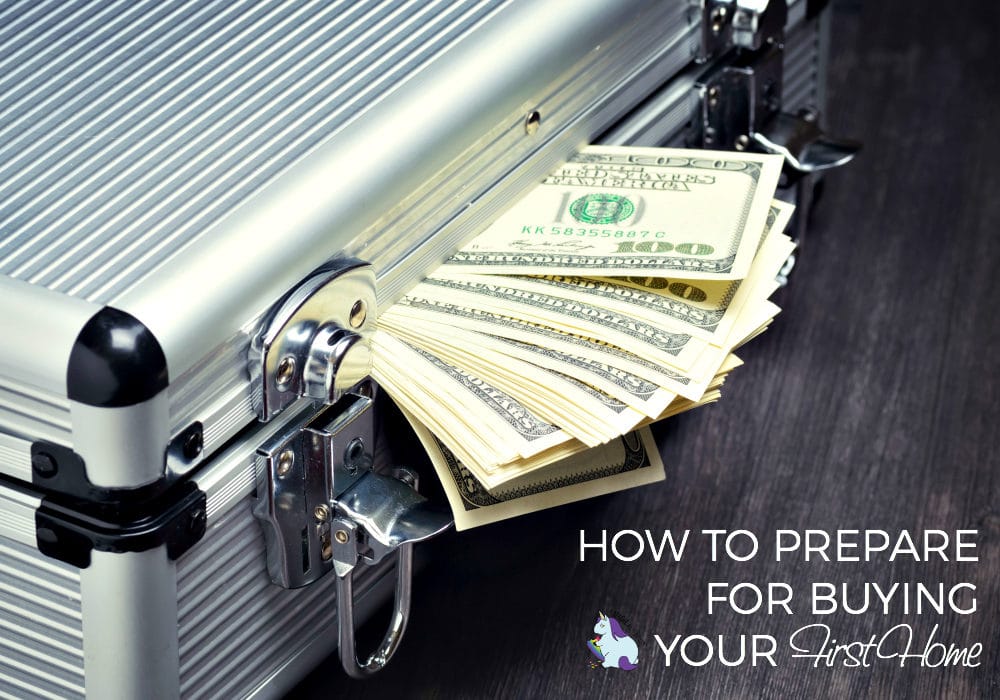How To Prepare for Buying Your First Home
While paying for your dream home with a briefcase full of cash sounds ridiculously cool, most of us will be dealing with different stacks of paper–the legal kind, riddled with fine print that require, seemingly, endless signatures.
This post was sponsored by Lexington Law Firm.
However, there are many positives that come with getting a mortgage. For example, it’s good for building credit and maximizing tax deductions. There are important things to consider BEFORE you head to the bank.

How to Get Ready to Buy Your First Home
Buying your first home should be an exciting experience, and planning ahead is key for a smooth and successful transition. Ideally, you’ll have a year or more to get yourself prepared, which will ensure you’re not exhausted from stressing over the process. Opening the front door of your new home should be cause for celebration, not tension.
Mentally:
Research. Shop around online and see home style interests you and what the price ranges are in your desired neighborhoods. Drive around those areas and get a feel for the community. You need to be comfortable with where you’ll live and spend the majority of your time.
Bust out the craft supplies! The power of vision boards should not be underestimated. Use magazine clippings, photographs, bullet-point lists, stickers, and ads to create a realistic, tangible Pinterest-style board that will provide constant inspiration.
This will keep your goals fresh in your mind and help maintain focus. Include all the things you see in your first home. Be reasonable to start, then add one or two fantasy features, like a big walk-in closet or giant jacuzzi tub.
Physically, both in physical space and health:
Fill a laundry basket with random belongings. Take them all out. Put them back in. This is what moving is like. Wash, rinse, repeat. And, don’t forget to stretch. Seriously, though, since we’re on the subject of belongings–it’s time to start clearing out the knick knacks you’ve accumulated over the years.
While many of those items may hold some sentimental value, hauling boxes of these items into your new home will likely result in rooms and closets being filled with unnecessary junk.
Begin this process before moving into your new home. Create a clutter-free environment in your current living space. There are studies showing your ability to think and make decisions is made easier when you clear the clutter.

If you’re buying a home with property, plan for whatever yard work the climate may demand–shoveling, raking, weeding, mowing. Are you prepared for the physical demands of weekly yard work? If you’re not planning to maintain the land and building yourself, be sure to factor the costs associated with maintenance into your budget. Landscaping alone can cost hundreds of dollars per month.
Get plenty of sleep. This may sound silly when preparing to buy your first home, but this is not the time for impulsive decisions. Sleep on big ideas and give your mind and body time to decompress. The home buying process can be tons of fun, but also quite stressful.
Financially:
Start saving…and never stop. To get the best interest rate on your mortgage, a healthy down payment and good credit can save you thousands. Private Mortgage Insurance (PMI) can help you get a mortgage without a 20% down payment, but there’s an added expense. Saving that initial chunk for a down payment will pay off exponentially.
Address any credit issues you may have on your report and get them repaired. This is incredibly important to handle as early as possible. If you’re someone like me and struggling with how to adult at this level, Lexington Law can help. They have professionals equipped and ready with all the complex language needed to communicate with creditors and help you make your credit report shine.
Don’t wait to learn effective budgeting until after you’ve moved in. Start the learning process now. It’ll prevent you from getting overwhelmed when those unforeseen expenses emerge.

Leave room for a travel fund! As much as you’re going to love being a homeowner, getting away is important, even if it means a short road trip. Allow yourself to get homesick, not sick of your home.
Do you have any tips for buying your first home?







